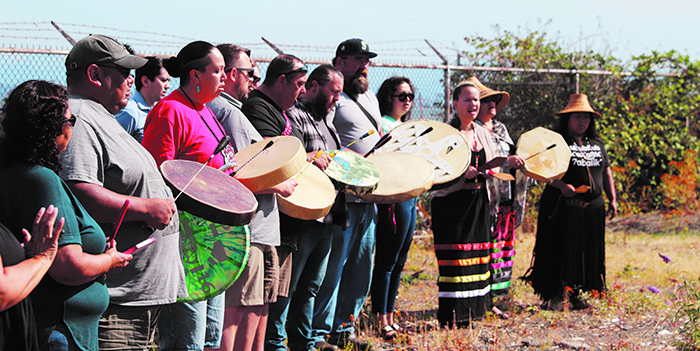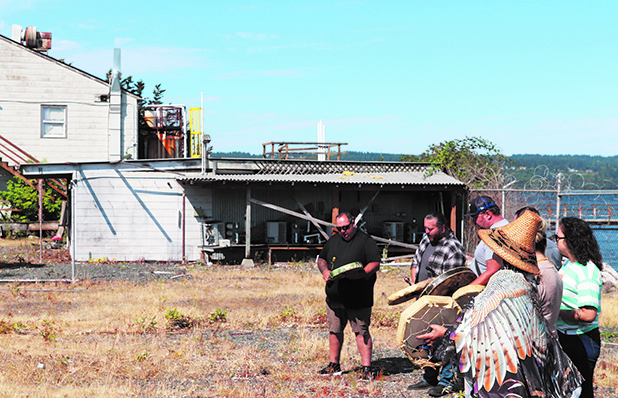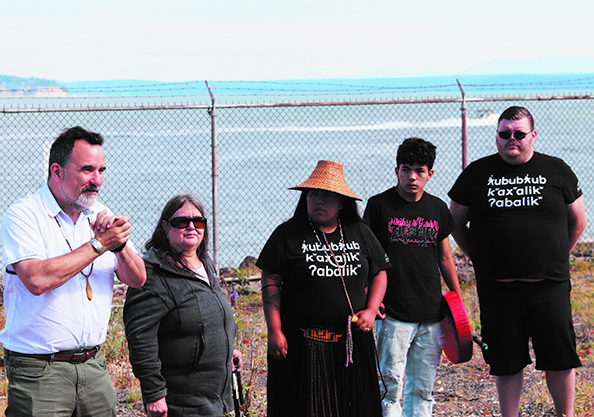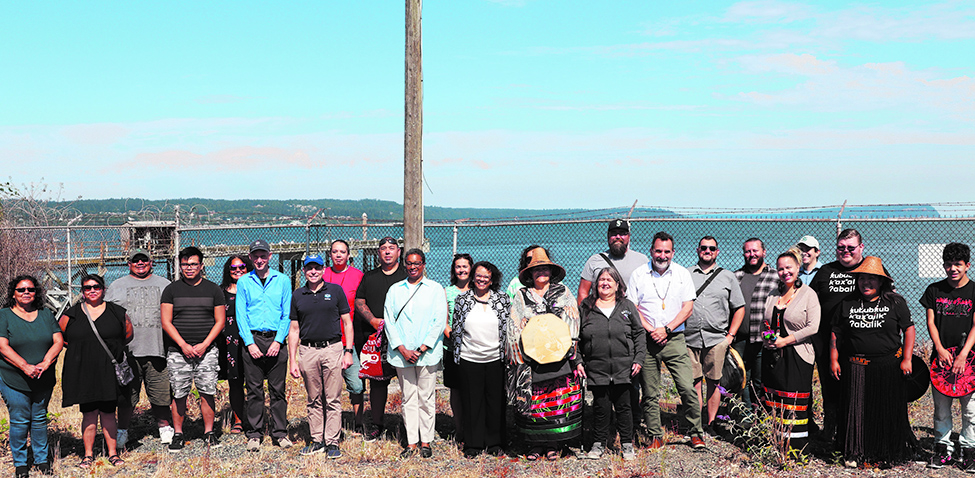
By Kalvin Valdillez, Tulalip News
Merely feet away from Mukilteo’s new ferry terminal is an abandoned building. With boarded up windows, no trespassing signs, broken glass along the grounds, fire-stained equipment, and a chain-link fence around the facility’s entire property, it’s hard to imagine what once took place in the building. However, the front door of the facility, at the time, stood wide open. And just inside the door was a large sign, that once pristinely stood in front of the property, that reads Northwest Fisheries Science Center Mukilteo Research Station, with a large logo of the National Oceanic and Atmospheric Administration (NOAA).
“The Mukilteo Research Station did research in marine science, aquaculture, eco toxicology, acidification, and such,” explained Deirdre Reynolds Jones, NOAA’s Chief Administrative Officer. “I’ve seen some of their work before they closed the station. They had fish tanks and studied crabs and different species of salmon, how they’re adapting to the environment as it changes – changes in water temperature and changes in chemicals in the water, and how what their eating is affecting their behavior.”

As Deirdre mentioned, the Mukilteo Research Station is now closed after nearly fifty years of operation. During that time, NOAA studied the Salish Sea and all its inhabitants, and their work has helped preserve and protect the local waterways. Because of the environmental and marine science work that they do, NOAA has built great partnerships with the treaty tribes of Northwest over the years.
“We’ve been working with NOAA for quite a while. They’re there to protect the environment and so are we,” expressed Tulalip Chairwoman Teri Gobin. “They’re out there testing the waters to make sure they are safe for our salmon. We commissioned them to do a count on how many pinniped seals are out there, and we need that information to move forward because they are an invasive species to the salmon. We’ve been working with NOAA for years with our Natural Resources department to make sure the waters are protected.”
Added Deirdre, “We have common goals, and as Chairwoman Gobin summarized, we need to ensure the salmon continue because they are so much a part of the culture here. The culturally significant part of being here is so integral to the mission that we perform.”
Following a brief rainfall, after close to two weeks of 90-degree summer days, the clouds passed and the sun shone brightly on the abandoned building on the morning of August 1st. Immediately next to the building, there were chairs and a canopy for shade arranged for a small gathering as the officials from NOAA and local tribal leaders, including Swinomish, Suquamish, and Tulalip, met for a unique ceremony.
“Normally we celebrate a grand opening for a new facility, but today we are acknowledging a change that’s going to happen on this property,” Deirdre said. “They’re going to demolish this facility, so it will be open space for a while. My understanding is that every time there’s a change in property, that’s of cultural significance to the tribal community. We pause to acknowledge we’re going to do something, and to ensure that the land and the ancestors are aware that we’re about to make a change.”
Although the facility has been shut down for over two years, NOAA wanted to invite the signatories of the 1855 Treaty of Point Elliott to the site before the building is torn down and turned over to the Port of Everett. Before colonization, current day Mukilteo was a place for Coast Salish tribes to gather, and many tribal ancestors lived along the beach community.
“This land is so important to us,” Teri expressed. “It’s where our ancestors had longhouses. We also signed the Point Elliott Treaty here.”
She continued, “All of our tribes used these waterways like our freeways to go from one place to another, and we have many relatives at all these different tribes. Our people met here together, and all agreed to sign the treaty. By ceding that land, from the water to the mountains, they guaranteed us our treaty rights for the future generations. I’m so glad that our ancestors thought about that when they did that, because they were trying to protect our tribes.”

At 10 a.m. on the dot, tribal members, from all three tribes in attendance, grouped together and sang Harriette Shelton-Dover’s Welcome Song. Each tribe then shared some words, prayers and offered a song in traditional Lushootseed while standing where their ancestors once stood and made a difficult but necessary decision. All the meanwhile, Washington State Ferries and Naval ships passed by in the background, voyaging sacred waters that were once only navigated by cedar canoes. Familiar with the Northwest Native culture, NOAA gifted blankets to each of the speakers throughout the morning, commemorating their partnerships with the tribes.
The news about the decommission of the research facility was released in 2020. Originally, NOAA planned a full remodel of the building to coincide with the recent facelift the Mukilteo waterfront has undergone. However, due to inflation caused by the aftereffects of the pandemic, NOAA could not afford the cost of construction that would be needed to build the new facility.
Dierdre explained that the property was once owned by the U.S. Navy. In the 1970’s the Navy transferred the property to NOAA, but the fine print indicated that if NOAA ever shut down the Mukilteo project, the property would then go to the Port of Everett.
After the demolition of the research station, the Port of Everett is looking to build something that will both compliment the new ferry terminal as well as solve Mukilteo’s traffic and parking issues. According to the Lynnwood Times, the most recent buzz is that a trolly station may be taking the place of the old NOAA facility.
NOAA plans to continue their research of the Salish Sea and their partnerships with the local tribes and will be fulfilling their work from the Manchester Research Station.

Dierdre, who traveled across the country from Washington D.C. for the ceremony said she was “completely moved by the songs that were shared and the stories that were told about the ancestors, the great-grandfathers and great-grandmothers who lived on the shoreline.”
Chairwoman Gobin shared, “Being out here and singing those songs, with our friends to the north and south, it was an honor. It felt like our ancestors were here. I know they’re watching us. When we start singing the songs, speaking the language, they gather and they’re here looking over what we’re doing. It was a blessing today. I’m really glad that Swinomish and Suquamish came here to be with us because this is where they came to sign their treaties too.”